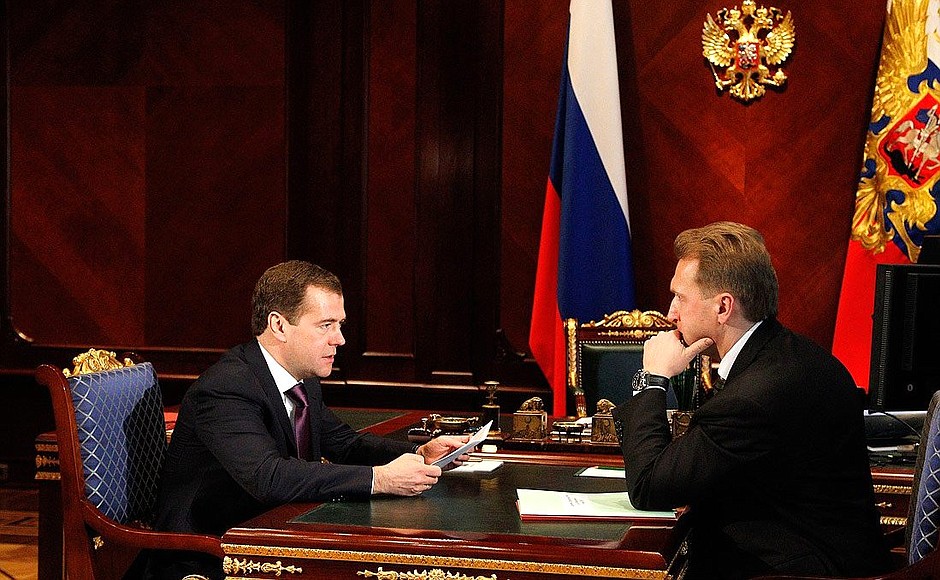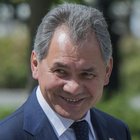
The instructions were issued at a meeting of the Commission for Modernisation and Technological Development of Russia’s Economy held in Magnitogorsk.
* * *
President of Russia Dmitry Medvedev: Mr Shuvalov, during the meeting of the Commission for Modernisation and Technological Development of Russia’s Economy that was held in Magnitogorsk, I issued instructions to the Government based on the so-called Magnitotogorsk ten measures to improve the investment climate in our country. The Government has been working on it and a number of measures have already been implemented.
I would like to hear your report on what has been done, particularly in certain areas that do not require any final amendments. I am referring to [government members stepping down from their seats on companies’] boards of directors and the introduction of the special investment ombudsmen post.
First Deputy Prime Minister Igor Shuvalov: Mr President, we last reported on the Government’s progress in implementing your instructions two weeks ago.
See also
Since then we have nearly finished our consultations with the executive authorities on the nomination of trustees who will gain seats on companies’ boards of directors and will represent the companies’ interests while acting on the Government’s instructions.
We coordinate these nominations with the Presidential Executive Office since some of the companies involved fall within the competence of the Presidential Executive Office and of the Russian Government.
You have set two deadlines for fulfilling your instructions. We are to replace board members in line with corporate procedures by July 1. Our target is to complete this work by the companies’ annual meetings, which are to be held by June 30. Where we fail to meet this deadline, we will immediately announce the meeting’s date or organise extraordinary meetings, where the appointments will be made. Nevertheless, in some companies members of the Government and Deputy Prime Ministers have already resigned from the boards of directors. The Government has not agreed with this approach and therefore these individuals continue to perform their duties until the appointment of their replacements.
Dmitry Medvedev: Somebody has to represent the state’s interests.
Igor Shuvalov: That’s right. We will meet the deadline with respect to replacing board members in the 17 companies you instructed us to tackle first, by June 30.
The work is ongoing in some other joint stock companies, or rather in the majority of the companies that were not mentioned by name in your instructions. But it is a difficult job because Government members, ministers and deputy prime ministers have to resign from the boards of directors by October 1 and we must find the candidates who have the required skills to understand highly complex issues and to impartially defend the interests of the companies whose boards they will sit on. At the same time, we must find sources of funding to pay for the services of those non-professional trustees.
Dmitry Medvedev: Russia is a big country and we have a lot of talented people, so I don’t think it should be a problem to find such trustees for even a significant number of companies if you look across the country. But, of course, they must be qualified and highly professional. As for payment, it is up to you to decide how to do it best because state officials had no right to receive remuneration for their work as members of boards of directors: that is expressly forbidden by the law. Their replacements will not be government officials. I don’t know, perhaps you can do it at the companies’ expense. After all, they pay salaries to other board members, those who are not government officials.
Igor Shuvalov: That is what we are planning to do.
Dmitry Medvedev: In that case, the payment will come from the company’s revenue.
Igor Shuvalov: In those cases where we fail to reach agreement with a company, perhaps due to less than perfect financial reporting or for some other reasons, we will seek these funds through the Federal Agency for State Property Management.
Dmitry Medvedev: In those cases, the Federal Agency can share some of the burden.
What about the other instructions?
Igor Shuvalov: Regarding the other issues, in line with your instructions, we have appointed deputy prime ministers in charge of the areas that present the greatest difficulties to investors, such as fire safety, the approval of investment projects, land allocation, customs and border control, and many other matters. The deputy prime ministers have held meetings and assigned tasks to executive power bodies regarding what they need to achieve in the coming months.
We will submit our reports to you by October, having consulted the Presidential Executive Office in order to arrive at specific plans of action for each particular area. Ministries have already begun submitting their proposals on some issues on their own initiative, including the Emergencies Ministry. Mr Shoigu has asked you to change the procedure for approving investment documents in terms of compliance with technical regulations on fire safety and ways to combine the Eurocodes with our existing requirements, a matter we are currently debating.
Dmitry Medvedev: As I recall, his suggestion is to apply the Eurocodes directly as part of our fire safety regulations. I think this is a good idea, because we are creating a common economic space with many states in the broad sense of the word. I do not mean the integration associations, but simply creating a new economic environment — that will be useful.
Igor Shuvalov: That is what we are doing, Mr President. We are working on implementing your instructions and analysing ways to smoothly introduce the Eurocodes as an alternative system while maintaining our standards and technical regulations on fire safety, including the fire safety requirements for buildings and facilities built in the European Union.
At the same time, we are processing complaints and requests from foreign companies. During the meeting you chaired on the investment climate in 2010, you instructed the Government to devise an appropriate mechanism for processing complaints and suggestions from companies that come across various problems in the Russian Federation. Simultaneously we established the post of the ombudsman and a relevant department in the Economic Development Ministry, a department that processes complaints and suggestions. There is also a special website where one can send a complaint, explaining the essence of the case, and the Government has special meetings with the individuals who submit their complaints.
The Government has received a total of 67 such complaints against federal and regional officials. The complaints relate to various issues, from the allocation of land to connection to the electric grid and services of natural monopolies.
We have found solutions to the satisfaction of the foreign investors in the majority of cases; we are conducting investigations on several complaints and in some cases we will not be able to come to a solution through an administrative procedure, which we report to the investors concerned and recommend that they take their cases to court because the ombudsman cannot be a substitute for the procedural law and the legislation on protection of investors’ rights when it comes to judicial review. Therefore, we are not trying to replace it with an administrative procedure; our aim is to complement it and to try to resolve conflicts out of court where possible.
At the moment, we are processing 21 complaints from a wide variety of companies, including Lafarge, IKEA, ROXOR and others. The companies face the greatest number of problems in Moscow and St Petersburg, which have many cases on the protection of property rights. Otherwise, the complaints mostly have to do with officials’ decisions on land issues and connection to power grids.
Dmitry Medvedev: This is an additional opportunity to resolve a problem out of court. It is a kind of mediation institute, with the difference that it is organised by the state and involves state agencies. I find it useful in any case, because it is an additional resource, another opportunity for investors to solve their problems, to complain about officials without resorting to legal action. Of course, they still have the right to take their cases to court and they can use it if they do not reach the desired outcome with the help of the investment ombudsman. So I think this is a positive development. It would be useful to obtain such information from across the country and take action in all Russian regions under the supervision of presidential plenipotentiary envoys, as stipulated in my instructions issued in Magnitogorsk. During the meeting we spoke about Executive Office representatives and local government officials monitoring this matter.
You must pull all these elements together: the efforts of the investment ombudsman and the measures to be taken as part of implementing the instructions issued during the meeting of the Commission for Modernisation and Technological Development of Russia’s Economy, which was held in Magnitogorsk.
Igor Shuvalov: We will fulfil your instructions and move forward.
Dmitry Medvedev: Good.

